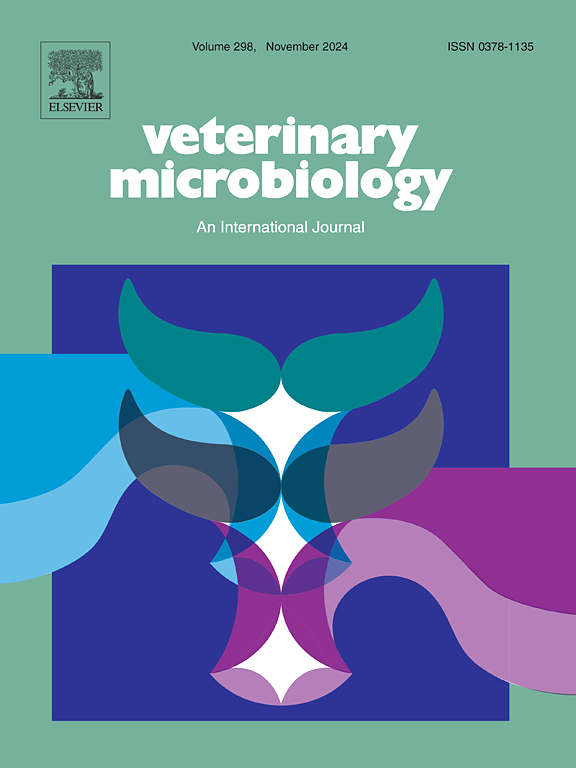Foxp3 inhibits PCV2 replication by reducing the ATPase activity of Rep
IF 2.4
2区 农林科学
Q3 MICROBIOLOGY
引用次数: 0
Abstract
Porcine circovirus type 2 (PCV2) is the pathogen that causes porcine circovirus disease, characterized by severe immunosuppression and significant economic losses in the swine industry. The replicase (Rep), one of the most critical non-structural proteins of PCV2, plays a pivotal role in viral replication. However, the mechanism by which Rep regulates the replication of PCV2 still requires further investigation. Our study demonstrated that PCV2 can infect regulatory T cells (Tregs), and within the nucleus, Rep interacted with Foxp3, while the structural protein capsid protein (Cap) did not exhibit this interaction. Further investigations revealed that the Forkhead domain of Foxp3 was crucial for mediating its interaction with the C-terminal region of Rep, which had an ATPase activity-regulating domain. The interaction between Foxp3 and Rep reduced the ATPase activity of Rep, thereby inhibiting PCV2 replication. This study provided a theoretical foundation for elucidating the role of Rep in PCV2 pathogenesis and contributed to a deeper understanding of the molecular mechanisms underlying PCV2 immune evasion.
求助全文
约1分钟内获得全文
求助全文
来源期刊

Veterinary microbiology
农林科学-兽医学
CiteScore
5.90
自引率
6.10%
发文量
221
审稿时长
52 days
期刊介绍:
Veterinary Microbiology is concerned with microbial (bacterial, fungal, viral) diseases of domesticated vertebrate animals (livestock, companion animals, fur-bearing animals, game, poultry, fish) that supply food, other useful products or companionship. In addition, Microbial diseases of wild animals living in captivity, or as members of the feral fauna will also be considered if the infections are of interest because of their interrelation with humans (zoonoses) and/or domestic animals. Studies of antimicrobial resistance are also included, provided that the results represent a substantial advance in knowledge. Authors are strongly encouraged to read - prior to submission - the Editorials (''Scope or cope'' and ''Scope or cope II'') published previously in the journal. The Editors reserve the right to suggest submission to another journal for those papers which they feel would be more appropriate for consideration by that journal.
Original research papers of high quality and novelty on aspects of control, host response, molecular biology, pathogenesis, prevention, and treatment of microbial diseases of animals are published. Papers dealing primarily with immunology, epidemiology, molecular biology and antiviral or microbial agents will only be considered if they demonstrate a clear impact on a disease. Papers focusing solely on diagnostic techniques (such as another PCR protocol or ELISA) will not be published - focus should be on a microorganism and not on a particular technique. Papers only reporting microbial sequences, transcriptomics data, or proteomics data will not be considered unless the results represent a substantial advance in knowledge.
Drug trial papers will be considered if they have general application or significance. Papers on the identification of microorganisms will also be considered, but detailed taxonomic studies do not fall within the scope of the journal. Case reports will not be published, unless they have general application or contain novel aspects. Papers of geographically limited interest, which repeat what had been established elsewhere will not be considered. The readership of the journal is global.
 求助内容:
求助内容: 应助结果提醒方式:
应助结果提醒方式:


